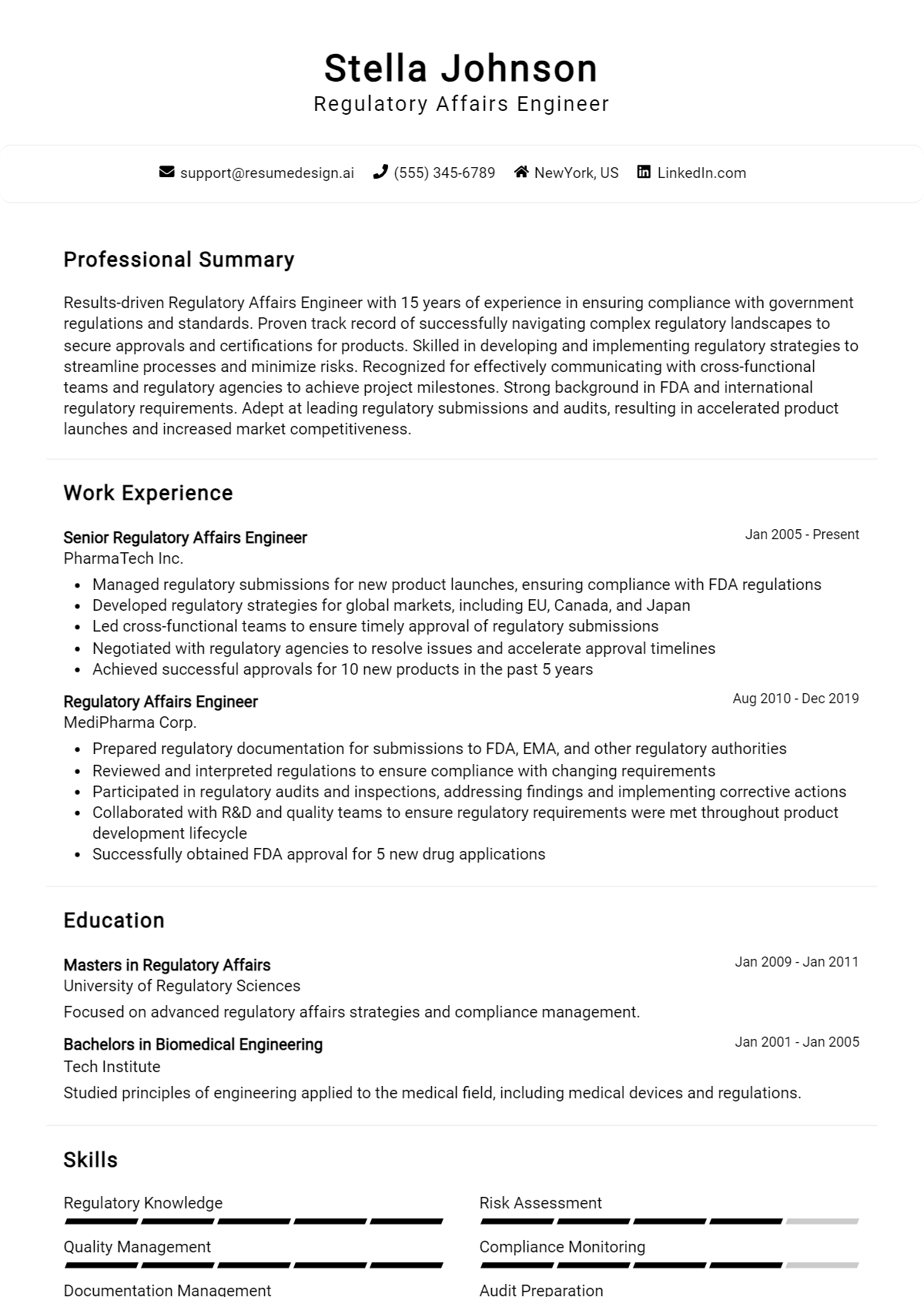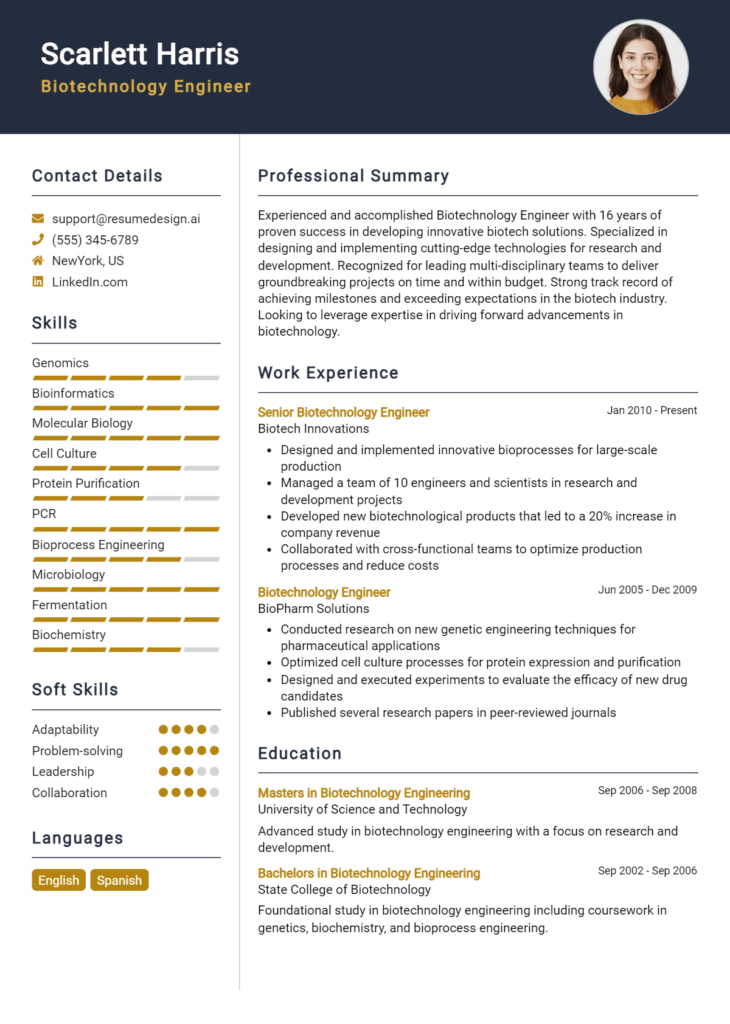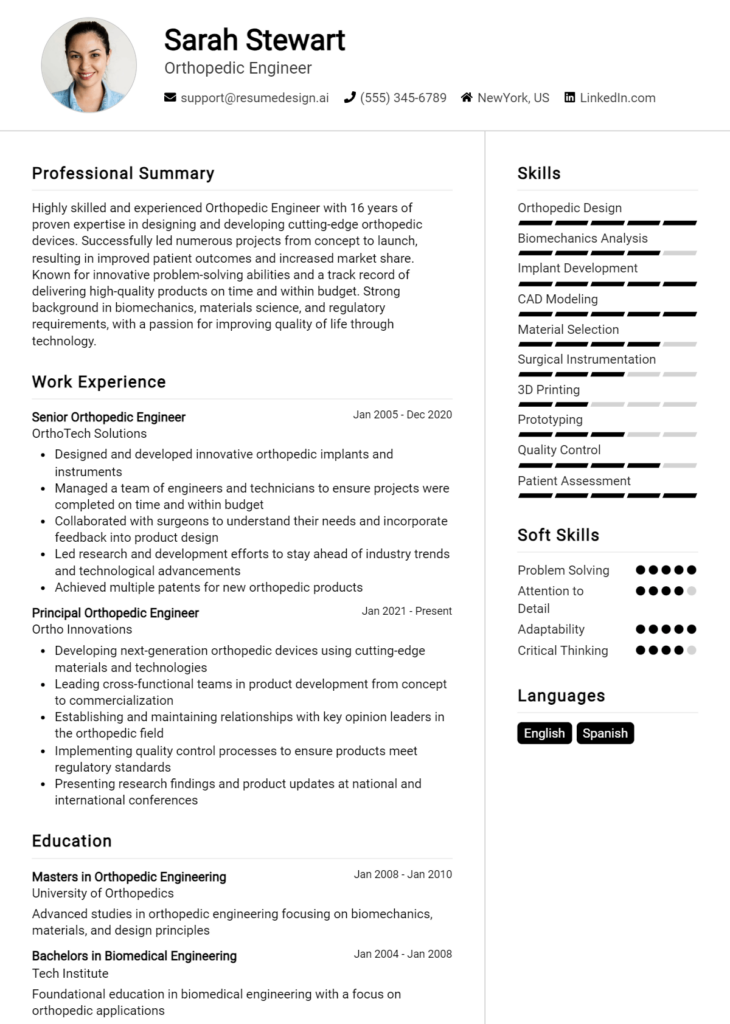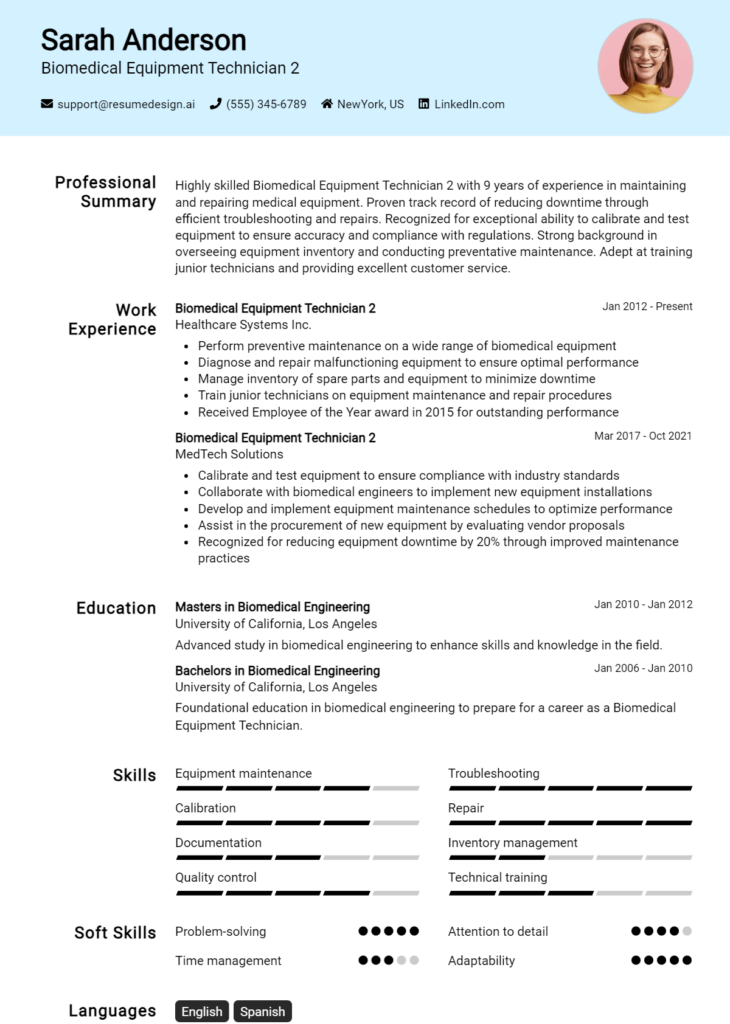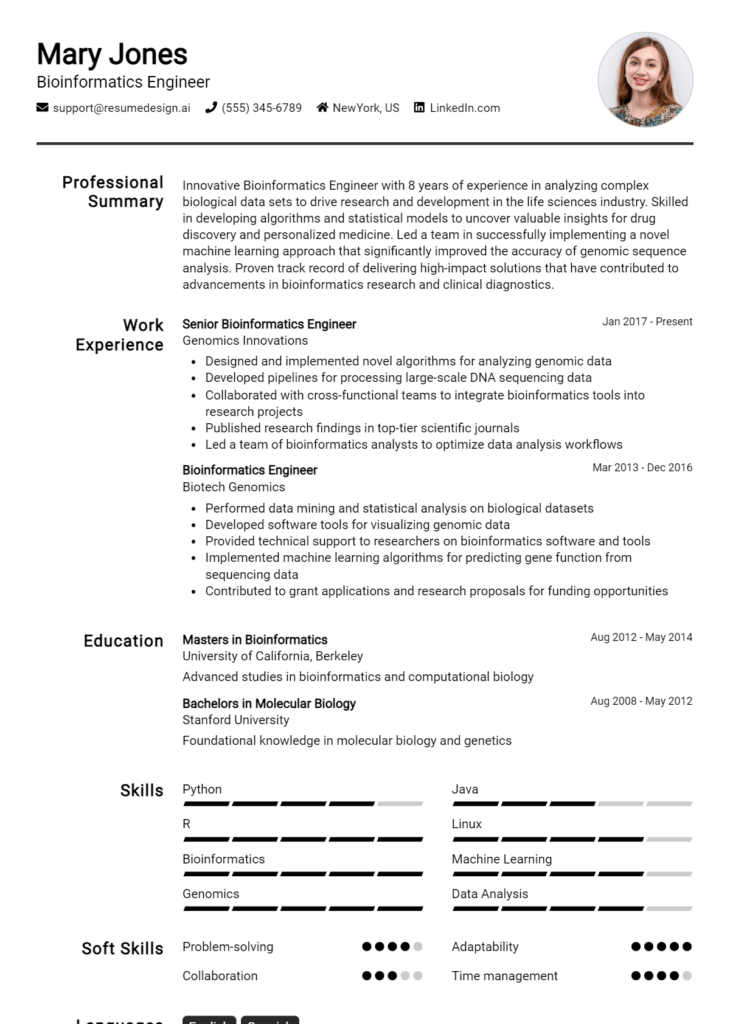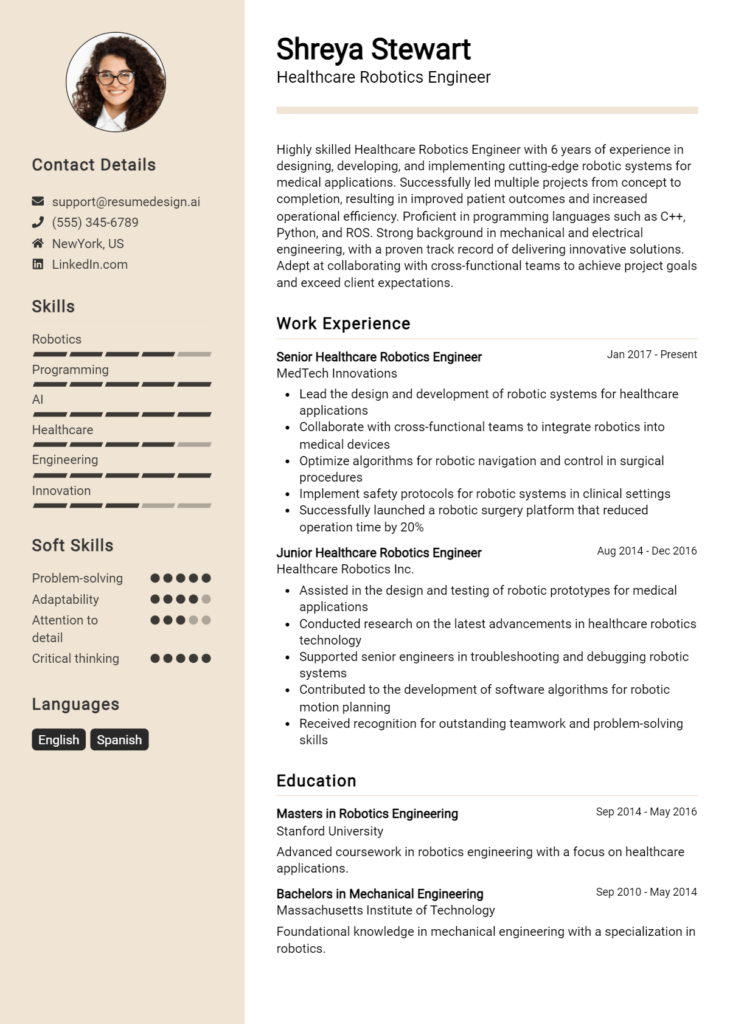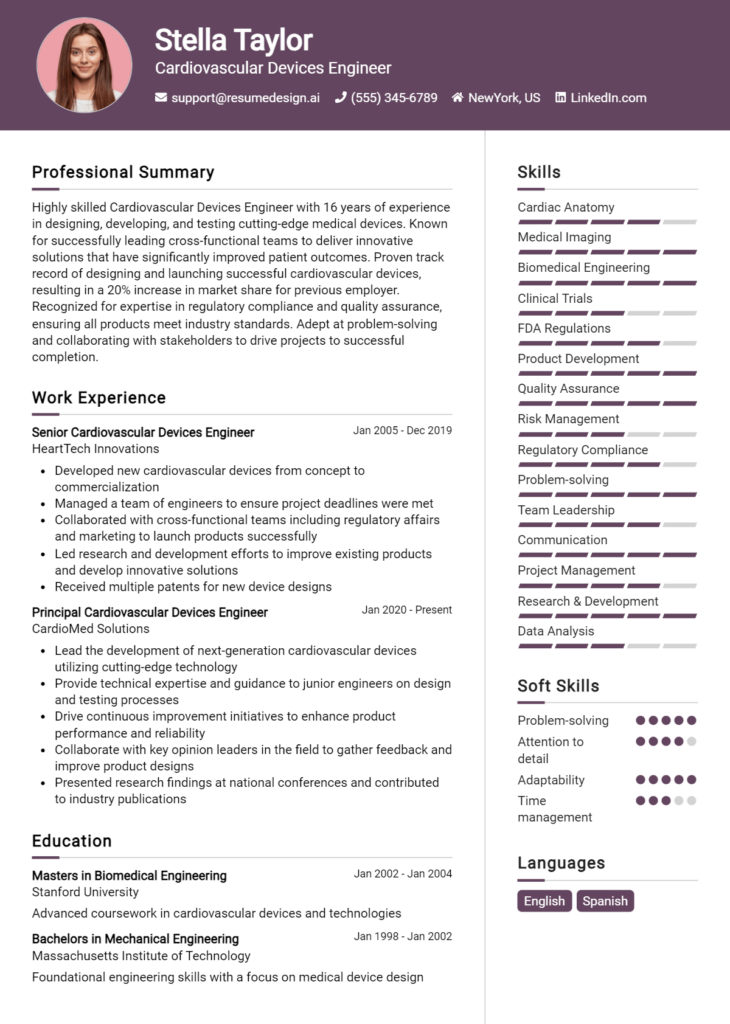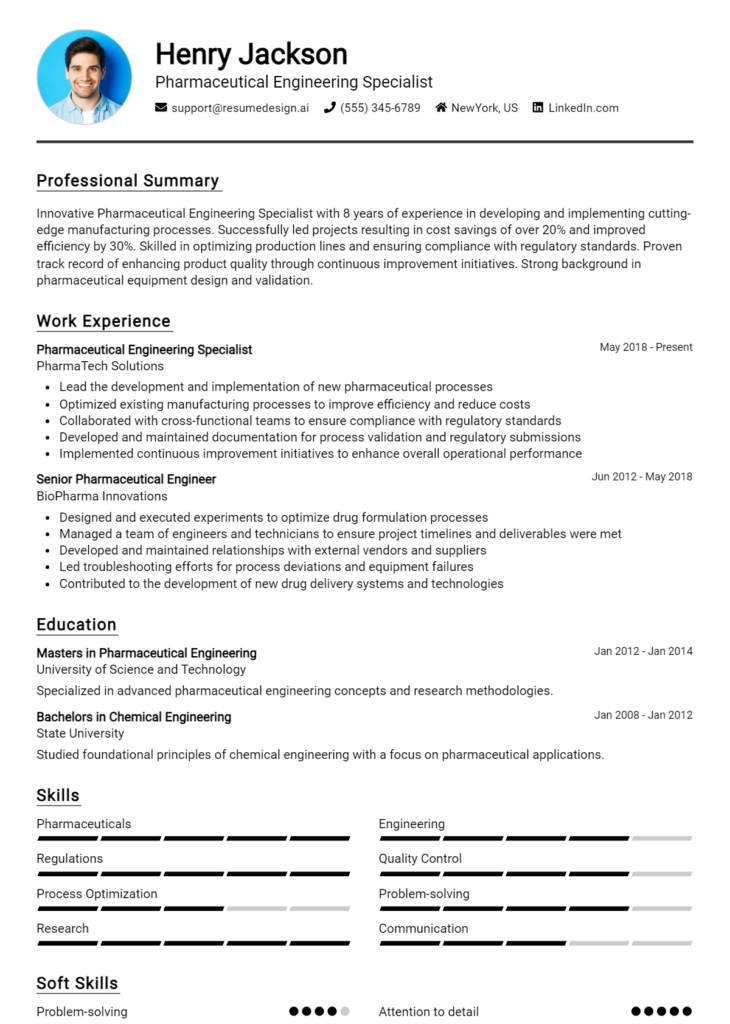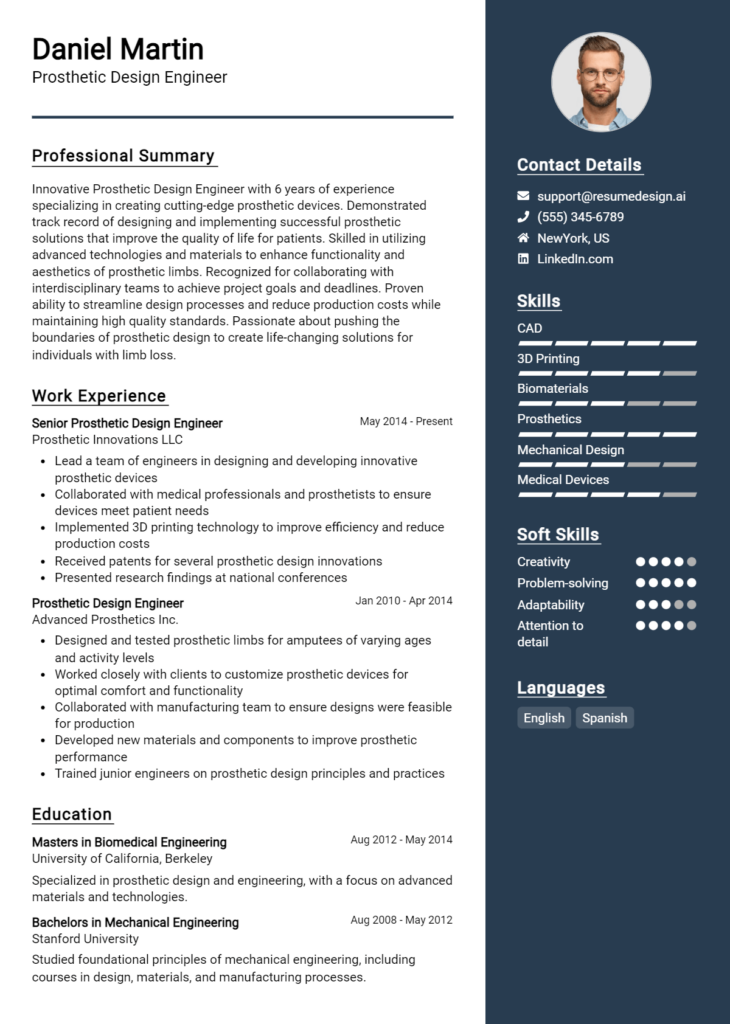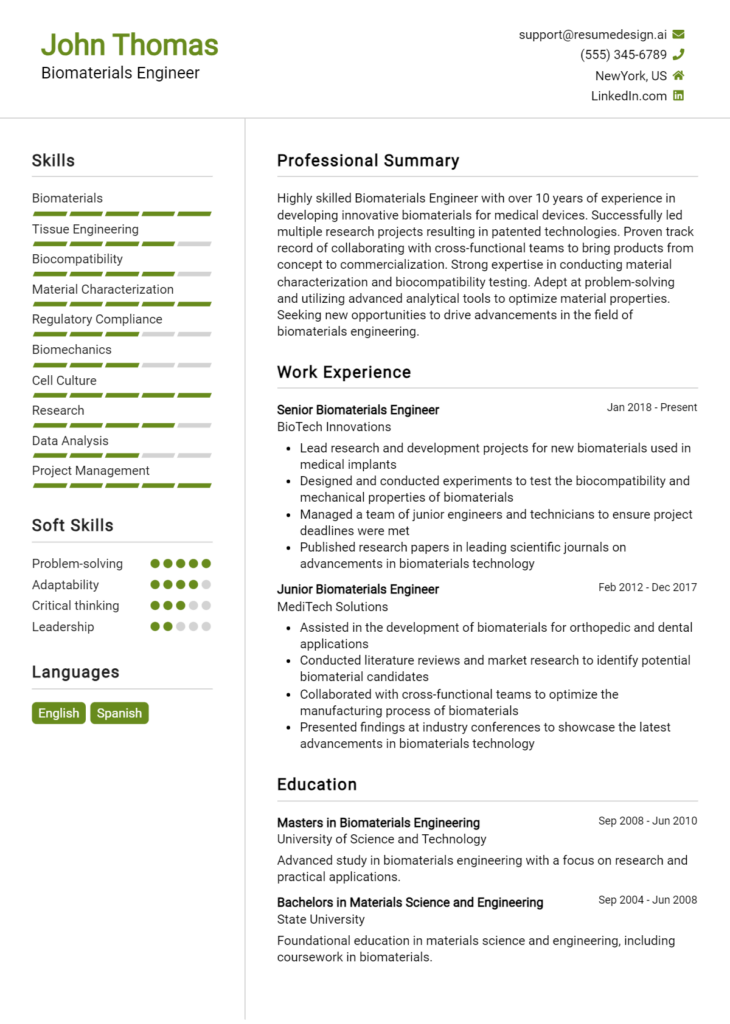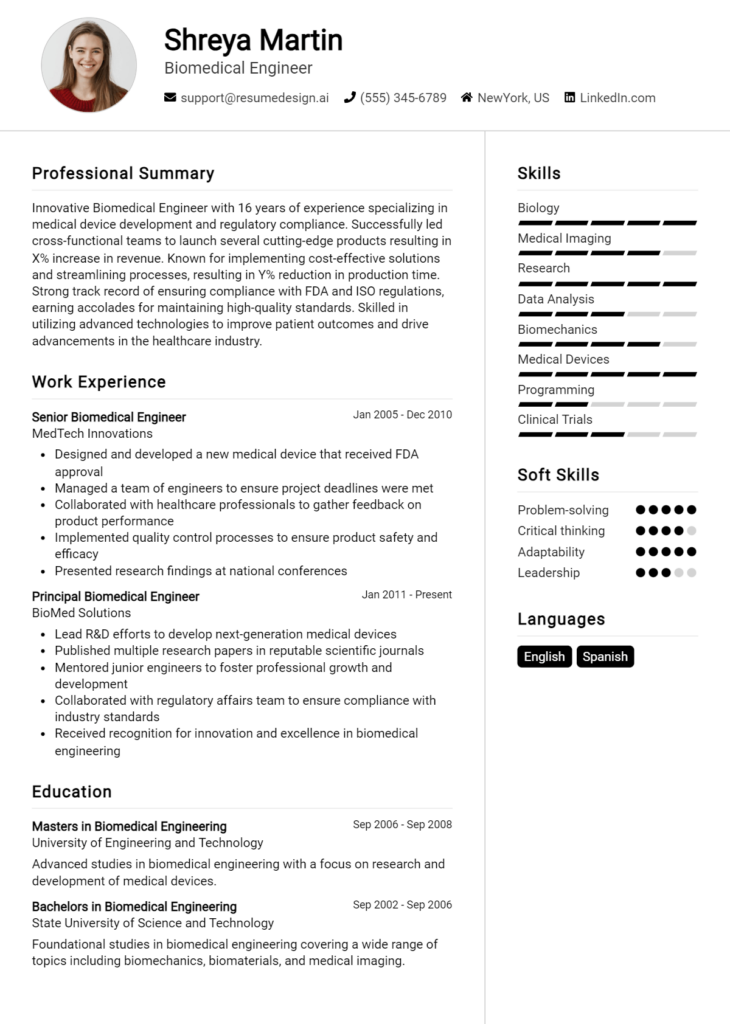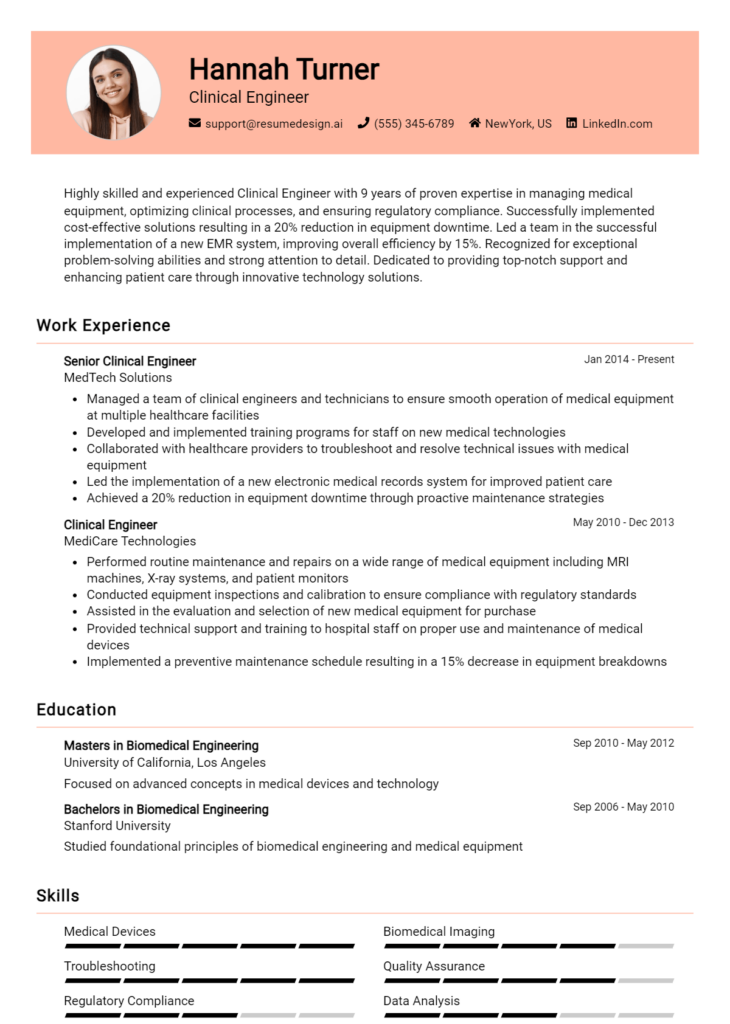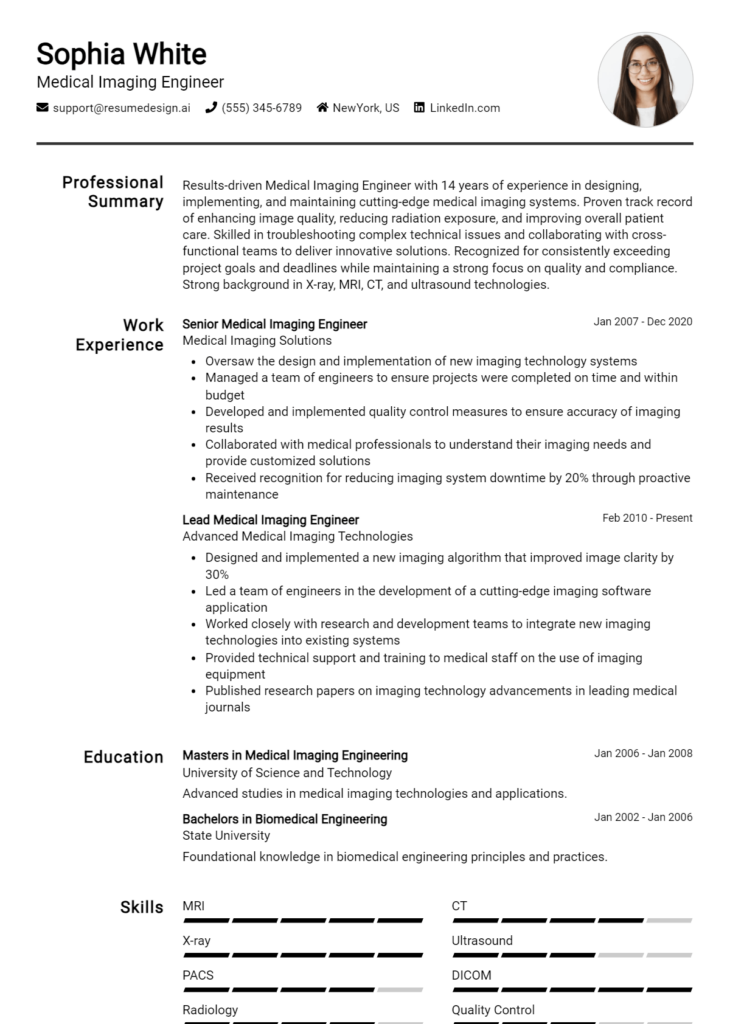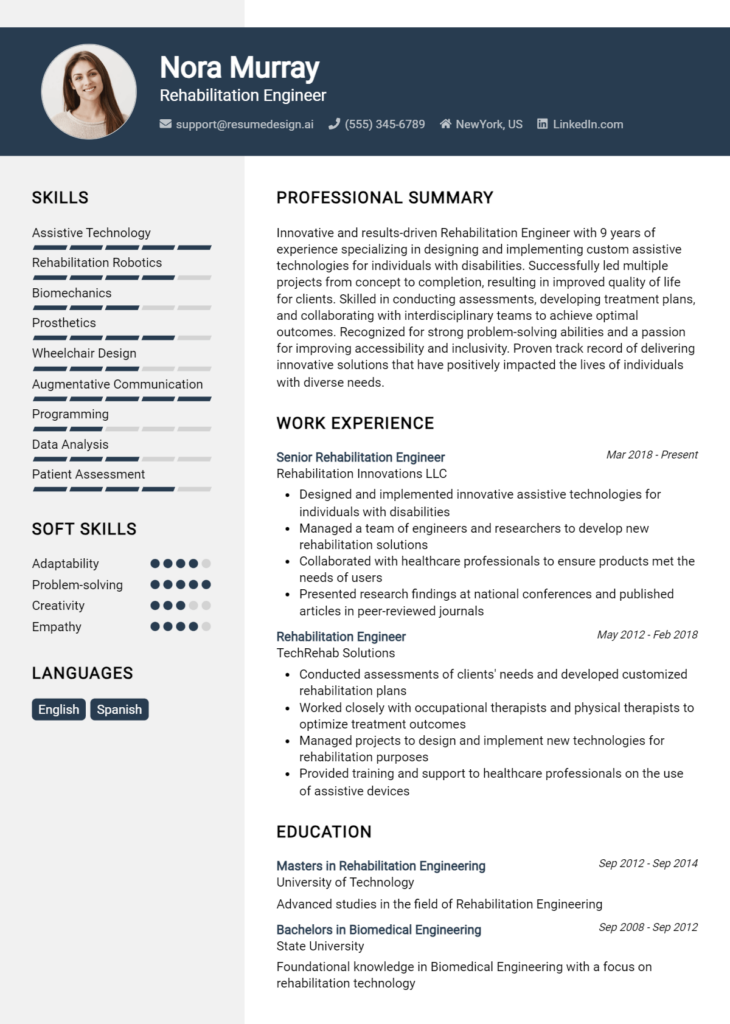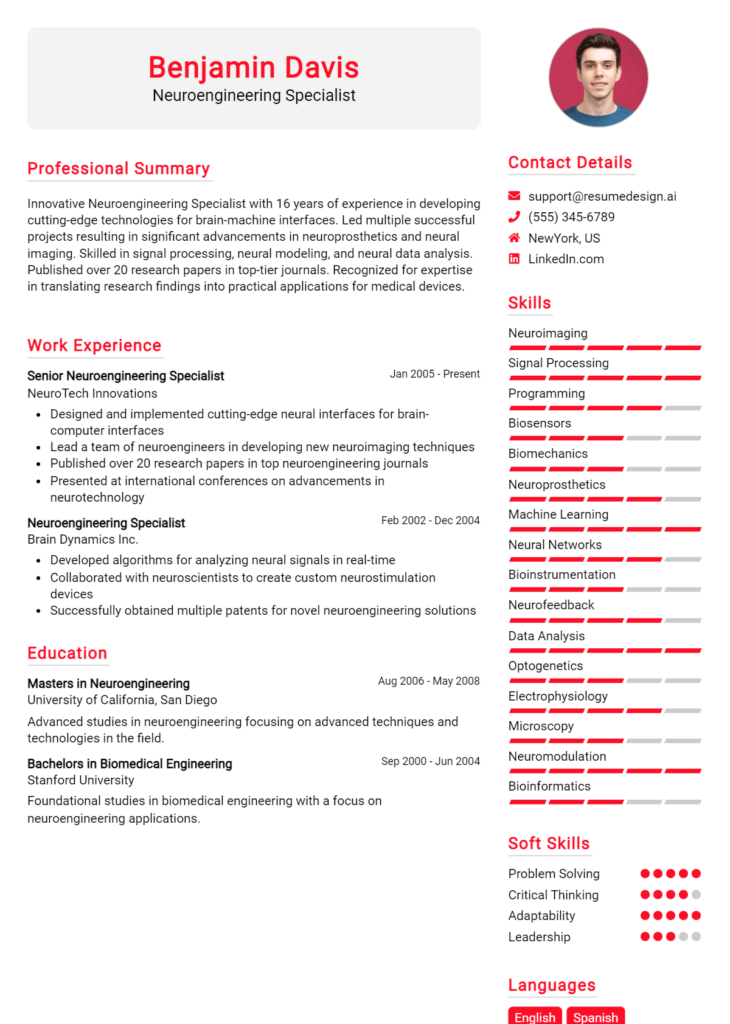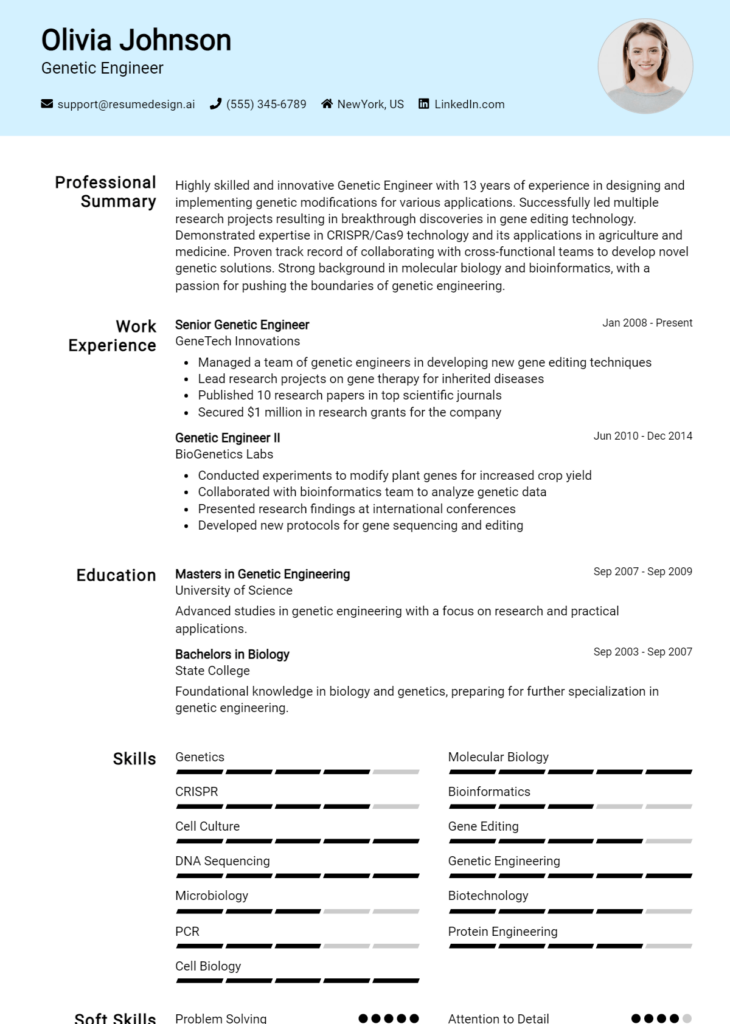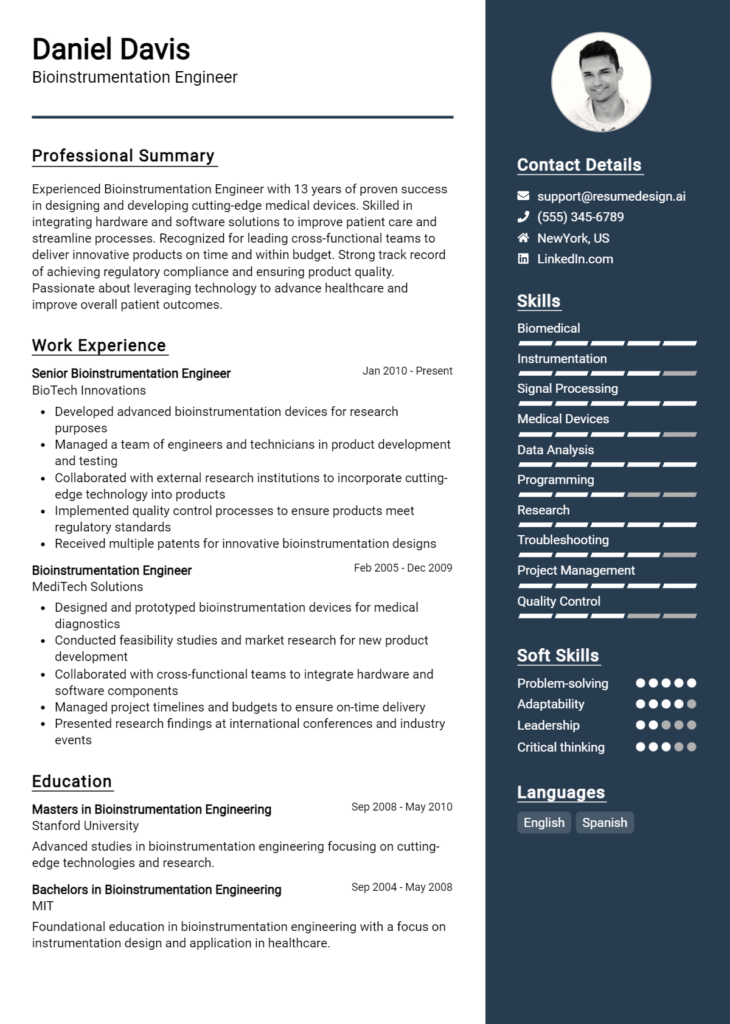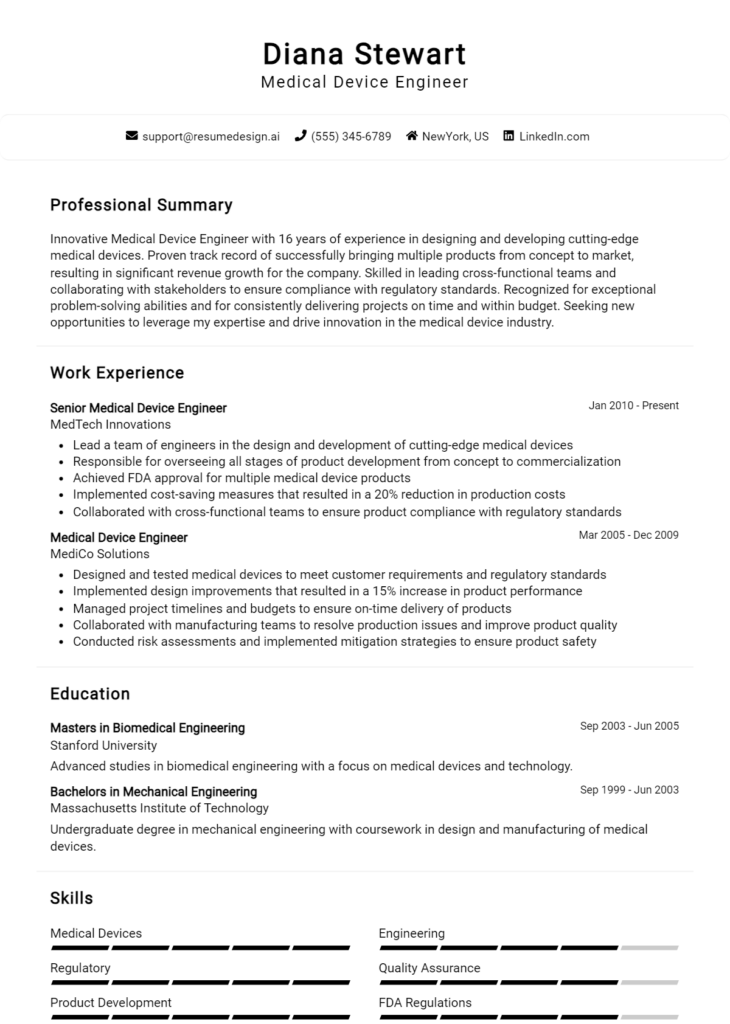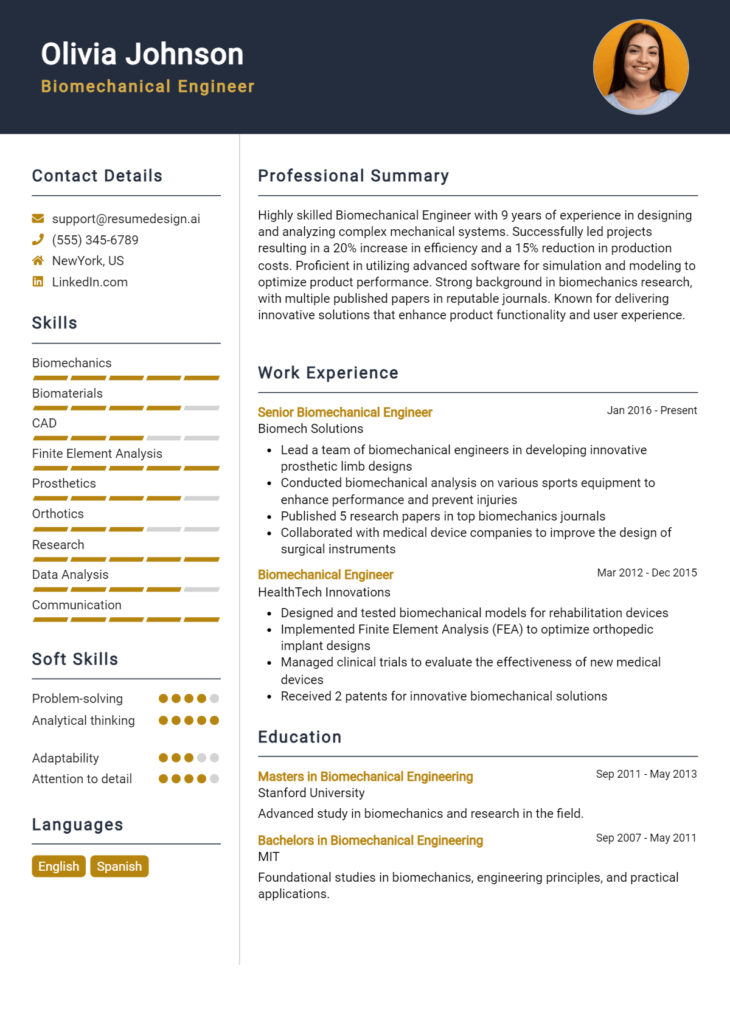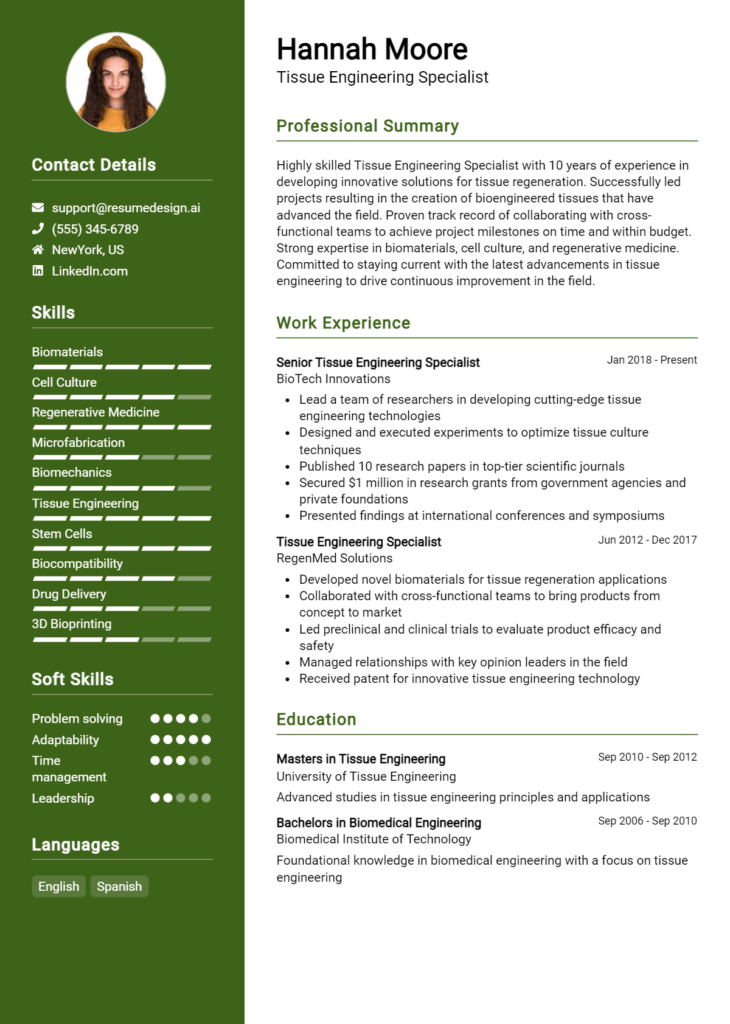Regulatory Affairs Engineer Core Responsibilities
A Regulatory Affairs Engineer plays a vital role in ensuring compliance with industry regulations, bridging the gap between engineering, legal, and operational teams within an organization. Key responsibilities include preparing and submitting regulatory documents, conducting risk assessments, and providing guidance on regulatory requirements. Success in this role demands strong technical knowledge, operational expertise, and adept problem-solving skills, all of which contribute to the organization's overall goals. A well-crafted resume can effectively highlight these qualifications, showcasing the candidate’s ability to navigate complex regulatory landscapes.
Common Responsibilities Listed on Regulatory Affairs Engineer Resume
- Prepare and submit regulatory documentation to governmental agencies.
- Conduct regulatory compliance assessments for products and processes.
- Collaborate with cross-functional teams to ensure product compliance.
- Monitor changes in regulations and assess their impact on the organization.
- Develop and maintain regulatory policies and procedures.
- Provide training on regulatory requirements to internal teams.
- Assist in preparing for audits and inspections by regulatory bodies.
- Analyze product development processes for compliance with regulations.
- Support product labeling and advertising compliance initiatives.
- Participate in risk management activities related to product safety.
- Document and communicate regulatory requirements to stakeholders.
- Facilitate communication between regulatory agencies and the organization.
High-Level Resume Tips for Regulatory Affairs Engineer Professionals
In the competitive field of regulatory affairs, a well-crafted resume is crucial for standing out among a pool of qualified candidates. For Regulatory Affairs Engineer professionals, this document serves as the first impression they make on potential employers, often determining whether they progress to the interview stage. A resume should not only capture essential skills and qualifications but also reflect notable achievements that demonstrate a candidate's ability to navigate complex regulatory environments. This guide will provide practical and actionable resume tips specifically tailored for Regulatory Affairs Engineer professionals, enabling them to effectively showcase their expertise and value in the industry.
Top Resume Tips for Regulatory Affairs Engineer Professionals
- Tailor your resume to each job description by incorporating relevant keywords and phrases found in the posting.
- Highlight your experience in regulatory submissions, compliance, and quality assurance to showcase your industry knowledge.
- Quantify your achievements, such as the number of successful submissions or reductions in approval times, to demonstrate your impact.
- Include specific certifications and training relevant to regulatory affairs, such as RAC or ISO certifications.
- Emphasize your understanding of global regulations and standards, as this is critical for many organizations.
- Showcase your ability to work cross-functionally with product development, clinical, and quality teams.
- Utilize a clean and professional format that enhances readability and allows key information to stand out.
- Incorporate a summary statement at the top of your resume that encapsulates your experience, skills, and career goals.
- List relevant technical skills, such as proficiency in regulatory compliance software or project management tools.
- Keep your resume concise, ideally one page, focusing on the most relevant and impactful information.
By implementing these tips, Regulatory Affairs Engineer professionals can significantly enhance their resumes, making them more appealing to prospective employers. A well-optimized resume not only highlights relevant experience and skills but also demonstrates a candidate's commitment to their field, ultimately increasing their chances of landing a job in this highly specialized arena.
Why Resume Headlines & Titles are Important for Regulatory Affairs Engineer
In the competitive field of regulatory affairs, a well-crafted resume headline or title serves as a critical first impression for candidates vying for the role of Regulatory Affairs Engineer. These headlines are essential as they not only capture the attention of hiring managers but also provide a snapshot of a candidate's key qualifications in an impactful phrase. A strong headline should be concise, relevant, and directly related to the specific job being applied for, effectively summarizing the candidate’s expertise and value proposition in a way that entices the reader to explore further.
Best Practices for Crafting Resume Headlines for Regulatory Affairs Engineer
- Keep it concise: Aim for one impactful phrase that encapsulates your qualifications.
- Be role-specific: Tailor the headline to reflect the specific position you are applying for.
- Highlight key skills: Incorporate essential skills that are relevant to regulatory affairs.
- Include years of experience: If applicable, mention your years of experience to establish credibility.
- Use action-oriented language: Start with strong action verbs or adjectives that convey your impact.
- Focus on accomplishments: If possible, incorporate specific achievements that demonstrate your effectiveness.
- Avoid jargon: Use clear and straightforward language that hiring managers can easily understand.
- Revise for relevance: Tailor your headline for each application to ensure it aligns with the job description.
Example Resume Headlines for Regulatory Affairs Engineer
Strong Resume Headlines
"Regulatory Affairs Engineer with 8+ Years of Experience in FDA Submissions and Compliance"
"Proven Regulatory Affairs Specialist Skilled in Risk Management and Quality Assurance"
“Dynamic Regulatory Affairs Engineer with Expertise in Global Market Access Strategies"
“Detail-Oriented Regulatory Affairs Professional with a Track Record of Successful Product Approvals"
Weak Resume Headlines
“Regulatory Affairs Engineer Looking for Opportunities"
“Experienced Professional in Regulatory Matters"
The strong headlines are effective because they immediately convey the candidate's relevant experience, specific skills, and accomplishments, making them memorable and impactful. They capture the essence of what makes the candidate a strong fit for the position, encouraging hiring managers to delve deeper into the resume. In contrast, the weak headlines lack specificity and clarity, failing to communicate the candidate's unique qualifications or contributions, which can lead to them being overlooked in favor of more compelling applicants.
Writing an Exceptional Regulatory Affairs Engineer Resume Summary
A well-crafted resume summary is crucial for a Regulatory Affairs Engineer as it serves as the first impression to hiring managers. This introductory paragraph succinctly encapsulates the candidate's key skills, relevant experience, and significant accomplishments, allowing them to stand out in a competitive job market. A strong summary not only captures attention quickly but also aligns closely with the specific requirements of the role, demonstrating the candidate's fit for the position. It should be concise, impactful, and tailored to showcase the most significant qualifications that relate directly to the job applied for.
Best Practices for Writing a Regulatory Affairs Engineer Resume Summary
- Quantify achievements to provide measurable impacts of your work.
- Focus on relevant skills that align with the job description.
- Tailor your summary specifically for each job application.
- Use strong action verbs to convey your contributions and achievements.
- Keep it concise, ideally within 2-4 sentences.
- Highlight industry-specific knowledge and regulatory expertise.
- Showcase your problem-solving abilities and successful project management.
- Incorporate keywords from the job posting to enhance relevance.
Example Regulatory Affairs Engineer Resume Summaries
Strong Resume Summaries
Dynamic Regulatory Affairs Engineer with over 7 years of experience in successfully navigating FDA submissions and ensuring compliance with ISO standards. Achieved a 30% reduction in submission timelines through streamlined processes, leading to quicker product launches.
Detail-oriented Regulatory Affairs Engineer with expertise in global regulatory submissions and post-market surveillance. Spearheaded a team project that resulted in a 50% increase in successful product approvals within the first submission cycle.
Results-driven Regulatory Affairs Engineer specializing in medical device compliance and risk management. Successfully managed regulatory submissions for 10+ devices, achieving a 95% approval rate and significantly enhancing company reputation in the market.
Weak Resume Summaries
Experienced engineer looking for a position in regulatory affairs. Familiar with some compliance processes and regulations.
Dedicated professional seeking to apply my skills in a challenging environment. I have some experience in regulatory affairs and am eager to learn more.
The strong resume summaries are considered effective because they provide specific accomplishments, quantify results, and highlight relevant skills that align with the role of a Regulatory Affairs Engineer. In contrast, the weak summaries lack detail and measurable outcomes, making them less compelling and failing to demonstrate the candidate's qualifications effectively. A strong summary not only showcases expertise but also creates a sense of confidence in the candidate's ability to contribute to the organization.
Work Experience Section for Regulatory Affairs Engineer Resume
The work experience section of a Regulatory Affairs Engineer resume is pivotal in highlighting a candidate's technical skills and their ability to manage teams effectively while ensuring the delivery of high-quality products. This section serves as a platform to showcase specific experiences that align with industry standards, demonstrating how the applicant has navigated complex regulatory environments, contributed to product development, and achieved compliance. By quantifying achievements, candidates can provide tangible evidence of their impact, making a compelling case for their suitability for the role.
Best Practices for Regulatory Affairs Engineer Work Experience
- Focus on quantifiable achievements, such as percentage improvements in compliance or successful audits passed.
- Highlight specific regulatory frameworks and standards you have worked with, such as FDA, ISO, or CE marking.
- Showcase your role in cross-functional teams and how you facilitated collaboration between departments.
- Detail your experience in leading projects that resulted in product approvals or successful submissions.
- Include metrics that illustrate the effectiveness of your regulatory strategies, such as time saved or cost reductions.
- Use action verbs to convey strong contributions, such as "led," "developed," "implemented," or "coordinated."
- Emphasize continuous learning by mentioning relevant certifications or training in regulatory affairs.
- Tailor your experiences to reflect job descriptions and requirements in the regulatory affairs field.
Example Work Experiences for Regulatory Affairs Engineer
Strong Experiences
- Led a cross-functional team that successfully achieved FDA approval for a Class II medical device, reducing the approval timeline by 30%.
- Developed and implemented a regulatory compliance tracking system that decreased non-compliance incidents by 40% within one year.
- Coordinated the preparation and submission of over 15 regulatory submissions across multiple regions, ensuring a 95% acceptance rate.
- Managed a team of three regulatory specialists, fostering collaboration that resulted in the successful launch of a new product line ahead of schedule.
Weak Experiences
- Worked on regulatory submissions.
- Helped with compliance tasks.
- Participated in team meetings regarding regulatory matters.
- Assisted in the development of regulatory documents.
The examples deemed strong stand out due to their specificity, quantifiable results, and clear demonstration of leadership and collaboration within regulatory processes. Conversely, the weak experiences are vague and lack measurable outcomes, making it difficult to assess the candidate's actual contributions or expertise. Strong experiences effectively illustrate the candidate’s value, while weak experiences fail to provide a compelling narrative of capability and impact.
Education and Certifications Section for Regulatory Affairs Engineer Resume
The education and certifications section of a Regulatory Affairs Engineer resume is crucial as it showcases the candidate's academic background and dedication to professional development. This section not only highlights relevant degrees and specialized training but also underscores the importance of industry-recognized certifications that demonstrate a commitment to staying updated in a rapidly evolving field. Providing information about relevant coursework and certifications enhances the candidate's credibility and aligns their qualifications with the specific requirements of the job role, making them a more attractive candidate to potential employers.
Best Practices for Regulatory Affairs Engineer Education and Certifications
- Include only relevant degrees and certifications that pertain to regulatory affairs or related fields.
- List educational qualifications in reverse chronological order, starting with the most recent.
- Highlight advanced or industry-recognized credentials such as RAC (Regulatory Affairs Certification) or similar certifications.
- Provide brief descriptions of relevant coursework that aligns with the skills required for the role.
- Incorporate any specialized training or workshops that enhance your understanding of regulatory processes.
- Ensure that all certifications are current and valid, indicating ongoing professional development.
- Use clear formatting to differentiate between degrees, certifications, and training for easy readability.
- Consider including affiliations with professional organizations in regulatory affairs to showcase networking and continuous learning efforts.
Example Education and Certifications for Regulatory Affairs Engineer
Strong Examples
- M.S. in Regulatory Affairs, University of Applied Sciences, 2020
- RAC (Regulatory Affairs Certification), Regulatory Affairs Professionals Society, 2021
- Certificate in Pharmaceutical Regulatory Affairs, Online Learning Institute, 2019
- B.S. in Biomedical Engineering, National University, 2018
Weak Examples
- Ph.D. in History, University of Historical Studies, 2015
- Certification in Digital Marketing, Online Certification Provider, 2020
- Bachelor's in Fine Arts, College of Arts, 2017
- Outdated certification in Clinical Trials Management, 2015
The strong examples are considered effective as they directly relate to regulatory affairs, showcasing relevant degrees, certifications, and specialized training that enhances the candidate's qualifications for the role. In contrast, the weak examples lack relevance to the field of regulatory affairs, featuring degrees and certifications that do not contribute to the necessary expertise or knowledge base required for a Regulatory Affairs Engineer position.
Top Skills & Keywords for Regulatory Affairs Engineer Resume
In the ever-evolving field of regulatory affairs, a well-crafted resume is essential for showcasing a Regulatory Affairs Engineer's capabilities and qualifications. Highlighting the right skills is crucial as they not only demonstrate your technical expertise but also reflect your ability to navigate complex regulatory environments. A strong combination of hard and soft skills can set you apart from other candidates, making your resume more appealing to potential employers. By focusing on these skills, you can effectively communicate your value and readiness to tackle the challenges in this critical role.
Top Hard & Soft Skills for Regulatory Affairs Engineer
Soft Skills
- Attention to Detail
- Effective Communication
- Problem-Solving
- Analytical Thinking
- Team Collaboration
- Time Management
- Adaptability
- Leadership
- Critical Thinking
- Conflict Resolution
- Interpersonal Skills
- Negotiation Skills
- Organizational Skills
- Decision-Making
Hard Skills
- Knowledge of Regulatory Guidelines (e.g., FDA, EMA)
- Risk Assessment and Management
- Quality Assurance and Control
- Technical Writing
- Submission Preparation (e.g., IND, NDA)
- Clinical Trial Regulations
- Product Lifecycle Management
- Regulatory Compliance Audits
- Data Analysis and Interpretation
- Familiarity with ISO Standards
- Electronic Regulatory Submissions
- Regulatory Intelligence
- Project Management
- Knowledge of Good Manufacturing Practices (GMP)
- Experience with Regulatory Software and Tools
- Familiarity with Environmental Regulations
By integrating these skills into your resume, along with a solid work experience section, you can create a compelling narrative that highlights your qualifications as a Regulatory Affairs Engineer.
Stand Out with a Winning Regulatory Affairs Engineer Cover Letter
I am excited to apply for the Regulatory Affairs Engineer position at [Company Name], as advertised on [Job Listing Source]. With a solid background in engineering and extensive experience in regulatory compliance within the medical device industry, I am confident in my ability to contribute effectively to your team. My comprehensive understanding of the regulatory landscape, coupled with my technical expertise, positions me uniquely to ensure that your products not only meet but exceed the stringent requirements set forth by governing bodies.
In my previous role at [Previous Company Name], I successfully led the regulatory submission process for several high-profile projects, resulting in timely approvals and market launches. I have a proven track record of collaborating cross-functionally with R&D, quality assurance, and manufacturing teams to integrate regulatory considerations into the product development lifecycle. My meticulous attention to detail and strong analytical skills have enabled me to identify potential compliance issues early, thus minimizing risks and ensuring smooth regulatory pathways.
I am particularly drawn to [Company Name] because of your commitment to innovation and quality in the healthcare industry. I admire your recent advancements in [specific product or technology], and I am eager to contribute my expertise in navigating complex regulatory frameworks to help bring groundbreaking solutions to market. I believe my proactive approach to staying updated with regulatory changes will be beneficial in maintaining compliance and fostering a culture of excellence within your organization.
Thank you for considering my application. I am looking forward to the opportunity to discuss how my background, skills, and enthusiasms align with the goals of [Company Name]. I am excited about the possibility of being part of a team that is dedicated to improving patient outcomes through innovative regulatory strategies. Please feel free to contact me at [Your Phone Number] or [Your Email Address] to arrange a convenient time for a discussion.
Common Mistakes to Avoid in a Regulatory Affairs Engineer Resume
When crafting a resume for a Regulatory Affairs Engineer position, it's essential to present your qualifications and experiences in a way that aligns with the expectations of hiring managers and regulatory standards. However, many candidates make common mistakes that can hinder their chances of securing an interview. Here are some pitfalls to avoid:
Lack of Tailoring to the Job Description: Failing to customize your resume for the specific role may lead to missing keywords and important skills that the employer is looking for. Always align your experience with the job requirements.
Overly Technical Language: While technical expertise is crucial, using excessive jargon can confuse hiring managers who may not have a deep understanding of all technical terms. Aim for clear and concise language that highlights your qualifications.
Ignoring Regulatory Frameworks: Not mentioning specific regulatory frameworks (e.g., FDA, ISO, CE marking) that you are familiar with can make your resume less appealing. Highlighting your knowledge of the relevant regulations shows your expertise in the field.
Neglecting Achievements: Focusing solely on job responsibilities rather than accomplishments can weaken your resume. Quantifying your achievements with metrics or outcomes demonstrates your impact and effectiveness in previous roles.
Poor Formatting: A cluttered or unprofessional layout can detract from the content of your resume. Use clear headings, bullet points, and consistent fonts to enhance readability and ensure your information stands out.
Lengthy Descriptions: Providing overly detailed descriptions of past roles can overwhelm the reader. Keep descriptions concise while still conveying the essential information and your contributions.
Omitting Soft Skills: Regulatory Affairs Engineers need strong communication and teamwork skills, but these are often overlooked. Including soft skills that complement your technical abilities can make you a more well-rounded candidate.
Neglecting Continuing Education: Failing to mention any ongoing training or certifications can suggest a lack of commitment to professional development. Highlighting relevant courses or certifications can indicate that you stay updated on industry changes and standards.
Conclusion
In summary, the role of a Regulatory Affairs Engineer is crucial in ensuring that products comply with all necessary regulations and standards within the industry. Key responsibilities include preparing and submitting regulatory documentation, liaising with regulatory agencies, and staying updated on changing regulations. As the landscape of regulations evolves, the importance of a well-crafted resume tailored to this profession cannot be overstated.
To optimize your chances of landing a position in this competitive field, it’s essential to have a resume that highlights your relevant skills, experience, and accomplishments. Take the time to review your Regulatory Affairs Engineer resume and make necessary updates to reflect your qualifications accurately.
For those looking to enhance their application materials, a variety of resources are available. You can explore resume templates, utilize a resume builder, and review resume examples to gain inspiration. Additionally, don't forget to check out cover letter templates that can help you make a strong first impression. Take action now to ensure that your resume stands out in the competitive job market!

